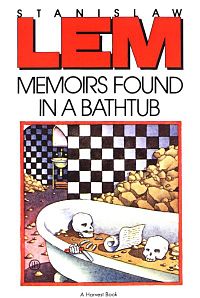- Memoirs Found in a Bathtub
-
Memoirs Found in a Bathtub 
English edition cover.Author(s) Stanisław Lem Original title Pamiętnik znaleziony w wannie Translator Michael Kandel and Christine Rose Country Poland Language Polish Genre(s) social science fiction, satire, dystopian, political fiction Publisher Wydawnictwo Literackie Publication date 1971 ISBN 0-15-658585-5 OCLC Number 12722996 Dewey Decimal 891.8/537 19 LC Classification PG7158.L39 P313 1986 Memoirs Found in a Bathtub is a science fiction novel by Stanisław Lem, First published English in 1973 (ISBN 0-8164-9128-3), a second edition was published in 1986 (ISBN 0-15-658585-5). The Polish original Pamiętnik znaleziony w wannie was first published in 1961.
Contents
Plot summary
Set in the distant future, Memoirs Found in a Bathtub is the horrifying first-hand account of a bureaucratic agent trapped deep within the subterranean bowels of a vast underground military complex. In a Kafkaesque maelstrom of terrifying confusion and utter insanity, this man must attempt to follow his mission directives of conducting an "on-the-spot investigation. Verify. Search. Destroy. Incite. Inform. Over and out. On the nth day nth hour sector n subsector n rendezvous with N."
The narrator inhabits a paranoid dystopia where nothing is as it seems, chaos seems to rule all events, and everyone is deeply suspicious of every one else. In danger of losing his mind, our protagonist starts keeping a diary, and it is this diary which details only a few days in his life that is ultimately found by a future society and given the title Notes from the Neogene. Memoirs Found in a Bathtub is this distant voice from the past, this Notes from the Neogene.
Reception
Theodore Sturgeon found Memoirs to be "A well-wrought nightmare indeed."[1]
Quotes
"I'll tell you. You're young, but you're one of us, and I'm one of us, so I'll tell you. Everything. Now, say someone's one of us. . . but he's also—you know—you can tell, right?"
"He's not—one of us," I said.
"Right! You can tell! But sometimes—you can't tell. You think someone's one of us, but they got to him and then he wasn't any more—and then we got to him, and he was—but he still has to look like he isn't, that is, like he only looks like he is! But they get wise to him and—now he isn't again, but he has to look like he isn't—or we'll get wise—and that's a triple!"
Miscellaneous
The name of the novel is a reference to James De Mille's dystopic classic, A Strange Manuscript Found in a Copper Cylinder (and not, as one may expect from a Polish author, to Potocki's earlier classic The Manuscript Found in Saragossa)[citation needed].
References
- ^ "Galaxy Bookshelf", Galaxy Science Fiction, November 1973, p.84
Major works of Stanisław Lem Novels Hospital of the Transfiguration (1948) • The Magellanic Cloud (1955) • The Investigation (1959) • Eden (1959) • Return from the Stars (1961) • Solaris (1961) • Memoirs Found in a Bathtub (1961) • The Invincible (1964) • His Master's Voice (1968) • The Futurological Congress (1971) • The Chain of Chance (1975) • Observation on the Spot (1982) • Fiasco (1986) • Peace on Earth (1987)
Short Story Collections The Cyberiad (1965) • The Star Diaries (1971) • A Perfect Vacuum (1971) • Tales of Pirx the Pilot and More Tales of Pirx the Pilot (1973) • Imaginary Magnitude (1973) • One Human Minute (1986)
Futurology Summa Technologiae (1964)
Film adaptations The Silent Star (1960 film) • Solaris (1968 film) • Solaris (1972 film) • Test pilota Pirxa (1978 film) • Solaris (2002 film) Ijon Tichy: Raumpilot (2007 TV series)
Categories:- 1961 novels
- 1973 novels
- Dystopian novels
- Novels by Stanisław Lem
Wikimedia Foundation. 2010.
